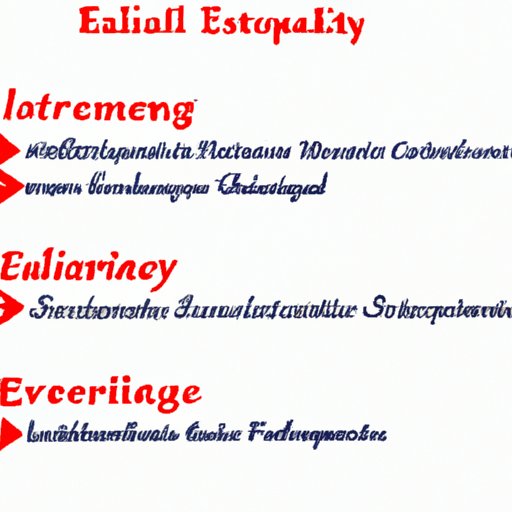Introduction
Leadership plays an essential role in the success of any organization, including healthcare organizations. Effective leadership in healthcare is characterized by a set of qualities that enable leaders to create positive change and improve organizational performance. In this article, we will explore the qualities, benefits, and challenges of effective leadership in healthcare.

Analyzing Qualities of Effective Leadership in Healthcare
An effective leader in healthcare has certain characteristics that make them well-suited for the job. These include excellent communication and interpersonal skills, the ability to motivate others, and the capacity to inspire trust. Additionally, effective healthcare leaders must be knowledgeable about the industry, have a clear vision for the organization, and be able to make difficult decisions.
In addition to these characteristics, effective healthcare leaders must possess certain skills and knowledge. They need to be able to develop strategies, manage resources, and think critically. They must also be able to understand the complexities of the healthcare system, anticipate challenges, and take appropriate action.
The benefits of effective leadership in healthcare are numerous. An effective leader can create an environment of collaboration and trust, encourage innovation and creativity, and promote a culture of respect and professionalism. Ultimately, effective leadership in healthcare can lead to improved patient care, increased employee engagement, and enhanced organizational performance.
Exploring the Benefits of Effective Leadership in Healthcare
One of the primary benefits of effective leadership in healthcare is improved patient care. An effective leader can ensure that patients receive the highest quality care by setting high standards for staff, monitoring performance, and implementing best practices. Furthermore, an effective leader can create a culture of safety and accountability, which can help reduce medical errors and improve patient outcomes.
Another benefit of effective leadership in healthcare is increased employee engagement. An effective leader can create an environment where employees feel valued and empowered. This can lead to greater productivity and better morale, as well as improved patient satisfaction. Additionally, effective leaders can foster a culture of learning and development, which can lead to better job satisfaction and retention.
Finally, effective leadership in healthcare can lead to enhanced organizational performance. An effective leader can create a vision for the organization and develop strategies to achieve it. This can result in improved efficiency, higher profitability, and better patient outcomes. Additionally, effective leadership can help organizations respond quickly to changes in the healthcare environment, such as new regulations or technologies.
Examining the Challenges of Effective Leadership in Healthcare
While there are many benefits to effective leadership in healthcare, there are also challenges. One of the biggest challenges is the complex regulatory environment. Healthcare organizations must comply with a variety of regulations, including those related to patient privacy and safety. An effective leader must be knowledgeable about these regulations, as well as any changes that may occur.
Another challenge of effective leadership in healthcare is managing change. The healthcare industry is constantly evolving, and an effective leader must be able to anticipate and adapt to changes. This includes being able to recognize potential opportunities and risks, and developing strategies to address them.
Finally, there is a shortage of skilled leaders in healthcare. Many organizations struggle to find qualified candidates who have the necessary skills and knowledge to fill leadership roles. This can lead to ineffective leadership, which can have a negative impact on organizational performance.

Comparing Different Models of Effective Leadership in Healthcare
There are several models of effective leadership in healthcare, including transformational leadership, servant leadership, and charismatic leadership. Transformational leadership focuses on inspiring followers through values and vision. Servant leadership emphasizes collaboration and teamwork. Charismatic leadership relies on the leader’s personal charisma to motivate and inspire followers.
Each model has its own strengths and weaknesses, and it is important to consider which model is best suited to the organization’s goals and objectives. For example, transformational leadership may be more effective in a rapidly changing environment, while servant leadership may be better suited to a team-oriented culture.
Understanding the Role of Effective Leadership in Healthcare
An effective leader in healthcare has several roles. They must set goals and expectations for the organization, develop strategies to achieve those goals, and create an environment for learning and growth. Additionally, they must be able to manage resources effectively and foster collaboration among staff.
Furthermore, an effective leader in healthcare must be able to motivate and inspire staff, build relationships with stakeholders, and cultivate a culture of respect and professional behavior. Finally, they must be able to identify and implement best practices, and ensure compliance with relevant regulations.

Investigating the Impact of Effective Leadership on Healthcare Outcomes
The impact of effective leadership on healthcare outcomes can be significant. An effective leader can lead to improvements in quality, cost reduction, and patient satisfaction. Quality improvement can be achieved through the implementation of best practices and the use of data to inform decision-making. Cost reduction can be achieved through the efficient use of resources and the elimination of unnecessary expenses.
Finally, patient satisfaction can be improved by creating a culture of respect and professionalism, as well as providing timely and respectful care. Additionally, an effective leader can ensure that patients receive the highest quality of care, which can lead to improved outcomes.
Conclusion
Effective leadership in healthcare is essential for the success of any organization. An effective leader must possess certain qualities and skills, and be able to manage resources and motivate staff. There are several models of effective leadership, each with its own strengths and weaknesses. Additionally, effective leadership can lead to improved patient care, increased employee engagement, and enhanced organizational performance.
The impact of effective leadership on healthcare outcomes can be significant. Quality improvement, cost reduction, and patient satisfaction can all be improved through the actions of an effective leader. Ultimately, healthcare organizations should strive to recruit and retain effective leaders in order to maximize the potential of their organization.
In conclusion, effective leadership in healthcare is essential for organizational success. Leaders must possess certain qualities and skills, and be knowledgeable about the healthcare industry. Additionally, they must be able to manage resources and motivate staff. Understanding the qualities, benefits, and challenges of effective leadership in healthcare is essential for organizations looking to improve their performance.
(Note: Is this article not meeting your expectations? Do you have knowledge or insights to share? Unlock new opportunities and expand your reach by joining our authors team. Click Registration to join us and share your expertise with our readers.)
